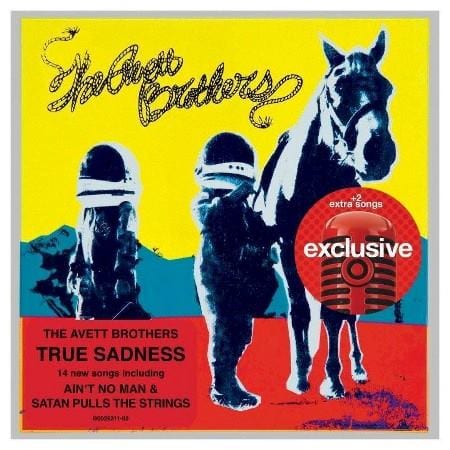
The Avett Brothers’ Album ‘True Sadness’ Delivers on Its Promise
Written by Jen O’Malley
There’s no doubt that The Avett Brothers have proven their genre-spanning ability over the past decade and a half. A vast discography showcasing unbounded potential has seen the North Carolina natives conquer the roles of traditional country crooners, folk rock revivalists and poets of heartbreak and despair. Rarely straying far from their trademark grittiness and emotionally purging lyricism, the Avett’s ninth studio album is an unconventional addition to their catalog.
True Sadness, the group’s fourth album produced by the legendary Rick Rubin, reveals the band’s desire to dip their toes into a world beyond banjos. Though they certainly haven’t abandoned their signature sound in the dust, their latest effort takes some of what we’ve come to expect from The Avett Brothers and combines it with an exploration of a more complex and, dare I say, trendy sound. The album is undoubtedly the most “plugged-in” of The Avett’s work and exposes some of Rubin’s likely influence in the studio. In an open letter to fans from Seth Avett himself, he describes True Sadness as “a myriad of contrasting fabrics” and cites an eclectic list of influences from Queen to Nine Inch Nails to Walt Disney.

The opening track, “Ain’t No Man,” is a foot-stomping celebration of sound. Released in April as the album’s first single, “Ain’t No Man” is an anthem of self-love and acceptance. The antithesis of certain self-deprecating singles past, it evokes jubilance reminiscent of a crowded gospel church on a summer Sunday. But The Avett Brothers waste no time interrupting that joy with melancholy on the following two tracks, “Mama I Don’t Believe” and “No Hard Feelings.”
“No Hard Feelings” digs particularly deep, opening with a question of mortality: “When my body won’t hold anymore, and it finally lets me free, will I be ready?” True Sadness is riddled with reflections, realizations and lessons learned.
“Smithstonian,” one of the album’s many lyrical gems, investigates the disappointing discoveries we make on our short-lived journeys through life. The Avetts repeatedly force us to face the frustrating truth that through it all: “turns out we don’t get to know everything.”

“You Are Mine” shows off the band’s experimentation with electronic sound while heading in a more positive direction. It is here that we are told of love’s ability to preserve us, rather than destroy us. “Satan Pulls The Strings” is (arguably) the most fun song on the album. The lyrics, all about struggling with temptation, are so country it hurts.
The instrumentation is a blast, especially the combination of twangy banjo and quirky synth. It’s one of the most unusual blends created on True Sadness.
The album’s second half discusses many dismal themes ranging from alcoholism to regret to unrequited love. (It is called True Sadness, after all.) The titular track is rightfully named, digging deep into the heart of what “True Sadness” means to The Avetts. The song seems to claim that the simple act of being a human is to be a sinner and to live with innate despair. It’s inside all of us if you “take the time to peel a few layers.” The album, though more modern and experimental, hasn’t lost The Avett Brothers’ deeply personal and often vulnerable style of songwriting.

“Divorce Separation Blues” accurately describes the painful fallout that follows a marriage dissolved. Seth Avett’s somber yodeling is the icing on this mournful cake. Closing out True Sadness, “May It Last” is a nostalgic, surreal and dream-like experience. It’s orchestral, it’s symphonic, and it’s unlike anything this band has done before.
There’s no denying that some longtime fans may need a little time to get used to The Avett Brothers’ slowly evolving sound and departure from their usual twang and grit. But, it’s well worth making that effort, because True Sadness has something unique and beautiful to offer. If there’s anything that this album proves, it’s that sometimes sadness doesn’t sound that sad, and, when it does, The Avett Brothers know how to make it particularly gut-wrenching.
Photographs by kind permission of Brian Hensley
